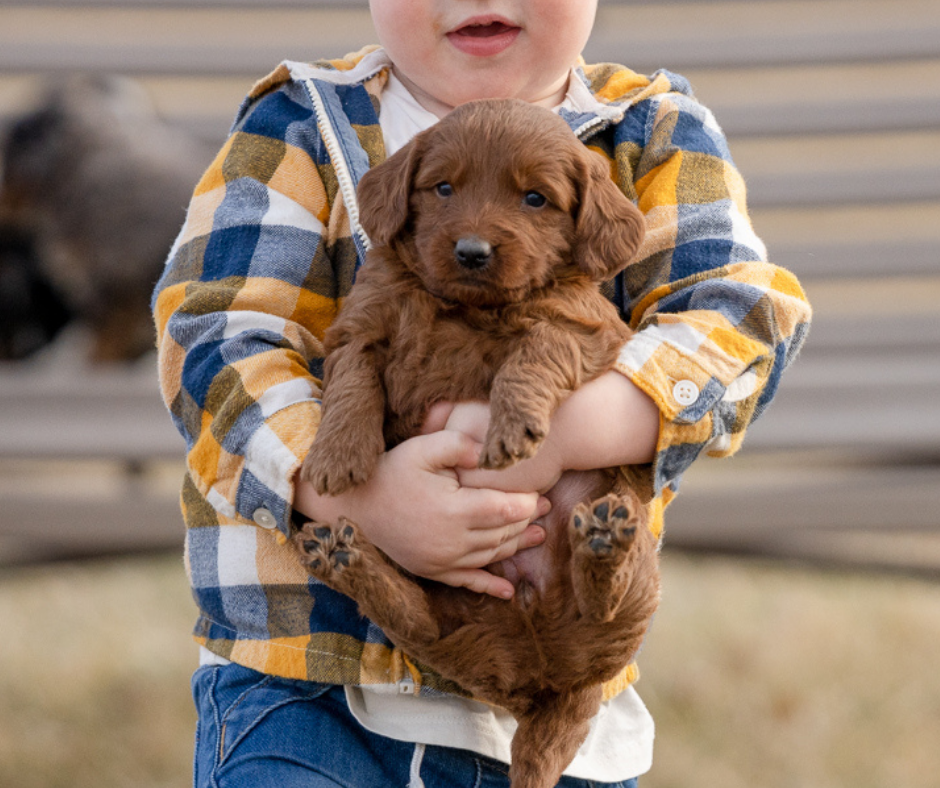Goldendoodles are among the most popular and beloved dog breeds in the United States and around the world. These adorable and affectionate hybrids, resulting from the crossbreeding of Golden Retrievers and Poodles, have won the hearts of countless dog lovers. If you're considering adding a Goldendoodle to your family, it's crucial to find a reputable breeder who prioritizes the health and well-being of their puppies.
To find the best Goldendoodle breeder, research thoroughly, prioritize genetic testing, visit their facilities, ask for references, review contracts, and consider their reputation.
Research is Key to Finding the Best Goldendoodle Breeder
The first step in finding the best Goldendoodle breeder is to conduct thorough research. Start by seeking recommendations from trusted sources, such as friends, family members, or veterinarians who have experience with Goldendoodles. Additionally, online communities and forums dedicated to dog enthusiasts can provide valuable insights into reputable breeders in your area.
- Visit Breeder Websites: Once you have a list of potential breeders, visit their websites to gather more information. A reputable breeder will have a professional website that provides details about their breeding program, the dogs they use for breeding, their commitment to health testing, and the puppies they have available. Take the time to explore these websites, as they can offer a glimpse into the breeder's dedication and transparency.
- Contact Breeders: Reach out to the breeders on your list and ask them questions about their breeding practices. It's essential to communicate directly with breeders to gauge their responsiveness and willingness to provide information. Ask about their experience, the health testing they perform on their breeding dogs, and the specific Goldendoodle litters they have available or planned.
- Ask About Genetic Testing: Genetic testing is a critical aspect of responsible breeding. Reputable Goldendoodle breeders prioritize the health and well-being of their puppies by conducting thorough genetic testing on their breeding dogs. Genetic testing helps identify and prevent hereditary diseases and conditions that can affect the offspring.
What Genetic Tests Should You Ask About When Looking for the Best Goldendoodle Breeder?
Here are some of the genetic tests that responsible breeders should perform on their breeding dogs:
- Hip and Elbow Dysplasia: Hip and elbow dysplasia are common orthopedic conditions in dogs, and they can be hereditary. Breeders should have their dogs evaluated for these conditions and share the results with potential buyers.
- Progressive Retinal Atrophy (PRA): PRA is a group of inherited eye diseases that can lead to blindness in dogs. Testing for PRA helps ensure that breeding dogs are not carriers of this condition.
- Von Willebrand's Disease (vWD): vWD is a bleeding disorder that can be passed on to offspring. Breeders should test for vWD to prevent this condition from affecting their puppies.
- Degenerative Myelopathy (DM): DM is a progressive spinal cord disease that can lead to paralysis. It's crucial for breeders to screen for DM to avoid producing puppies at risk of developing this condition.
- Coat Type and Color Genetics: Goldendoodles come in various coat types and colors. Breeders should understand the genetics behind coat type and color to produce puppies that meet the desired standards.
When contacting breeders, inquire about the genetic testing they perform on their breeding dogs and ask to see the test results. A responsible breeder should be transparent and eager to share this information. Here at Rafter E Pups, we make sure our breeding pairs are clear of any genetic issues.
What Can You Do to Find the Best Goldendoodle Breeder?
When you decide to bring a Goldendoodle into your life, you embark on a journey filled with love, companionship, and joy. But finding the perfect Goldendoodle begins with finding the best breeder.
- Try to Visit the Breeding Facility: Schedule a visit to the breeder's facility if possible. During your visit, assess the living conditions of the dogs and puppies. A reputable breeder will maintain clean and well-organized facilities. Pay attention to the dogs' overall health, temperament, and socialization. Interaction with the puppies and their parents can provide valuable insights into the breeder's commitment to the well-being of their dogs.
- Ask for References: Don't hesitate to ask the breeder for references from previous puppy buyers. Contact these references to inquire about their experiences with the breeder, the health of their Goldendoodle puppy, and any ongoing support they received. Positive references can be a strong indicator of a breeder's reliability and commitment to their puppies.
- Review Contracts and Health Guarantees: A responsible breeder will provide a detailed contract that outlines the terms and conditions of the sale. Read the contract carefully and ensure it includes provisions for the health and well-being of the puppy, such as vaccinations, deworming, and a health guarantee. The health guarantee should specify the breeder's actions if the puppy develops a genetic or hereditary health issue.
- Consider Breeder Reputation: Look for reviews and testimonials about the breeder online. Reputable breeders often have a positive online presence and receive good reviews from satisfied puppy buyers. However, remember that online reviews should be considered alongside other factors, such as genetic testing and your impressions during your visit
- Be Patient and Prepared to Wait for the Best Goldendoodle Breeder: Finding the best Goldendoodle breeder may take time. Reputable breeders often have waiting lists, and it's worth waiting for a well-bred, healthy puppy. Avoid the temptation to purchase a puppy from a less reputable source out of impatience or convenience.
Why is Early Socialization Important?
Early socialization is vital for puppies as it helps them develop into well-adjusted, confident, and well-behaved adult dogs. Good breeders understand the importance of early socialization because they are committed to producing healthy and well-rounded puppies.
Early socialization involves exposing puppies to a variety of people, animals, environments, and experiences during their critical developmental period, typically between 3 to 14 weeks of age.
Here's why it's essential and why good breeders prioritize it:
- Behavioral Development: Early socialization helps puppies learn to interact with other dogs and people, reducing the likelihood of fear or aggression towards them as adults. Well-socialized puppies tend to be more confident and less anxious.
- Reduced Anxiety: Puppies exposed to different environments, sounds, and stimuli are less likely to develop phobias or anxiety-related issues later in life. They learn to adapt to new situations and environments with ease.
- Improved Training: Socialized puppies are more receptive to training and tend to learn commands and behaviors more quickly. This makes them easier to manage and ensures a harmonious relationship with their owners.
- Prevention of Behavior Problems: Dogs that are not properly socialized may develop behavior problems such as fear aggression, separation anxiety, or excessive barking. Early socialization can prevent or mitigate these issues.
- Enhanced Bonding: Socializing a puppy allows for positive interactions and bonding with their human family members. This bond forms a foundation for a strong and loving relationship.
Good breeders understand the significance of early socialization because they are dedicated to producing puppies that are not only physically healthy but also mentally and emotionally well-adjusted. They expose their puppies to various stimuli, people, and experiences in a controlled and safe manner from a young age. This commitment ensures that the puppies are more adaptable, confident, and better prepared to thrive in their new homes, contributing to their overall well-being and the happiness of their owners.
Choosing a Goldendoodle breeder is a significant decision that will impact your life and the life of your future furry family member. Prioritizing genetic testing is crucial to ensure that your Goldendoodle puppy has the best chance at a healthy and happy life. By following the steps outlined in this guide and insisting on genetic testing, you can make an informed decision and provide your new Goldendoodle with the love and care it deserves. Remember that responsible breeding practices lead to healthier puppies, and your commitment to finding the best breeder will contribute to the well-being of this beloved breed.

